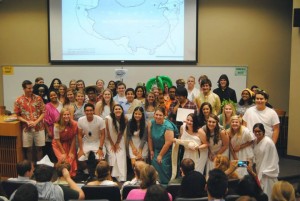
Following the shooting at Umpqua Community College in Oregon, the age-old debate regarding gun control has arisen again. While we all might not be able to agree as to how firearms should be regulated in the United States, I would hope that we can all agree that there are currently 15 families in Oregon that are in need of support. Nine people have died and six have been critically wounded. Our thoughts and prayers here at the QuickBIC are with these families as we delve into the issue which has so drastically affected their lives.
On October 29, 2015, Christopher Harper-Mercer, age 26, entered room 15 of Umpqua Community College in Roseburg, Oregon and, armed with body armor, five handguns, and a semiautomatic rifle, proceeded to execute his fellow classmates and professors. Within five minutes of the first gunshot, local law enforcement arrived and began trading fire with Harper-Mercer. Two minutes later, along with nine of his victims, the gunman lay dead.
In order to survive, some students played dead next to their wounded classmates as Harper-Mercer fired into the heap of cowering bodies. Others, such as army veteran Chris Mintz who was shot six times as he attempted to prevent the gunman from entering another classroom, struggled to protect the lives of their fellow human beings in the face of such a travesty. (Mintz is expected to recover from his wounds.)
Unfortunately, we are all too familiar with the horror of school shootings. The very mention of “Columbine” or “Sandy Hook” evokes bleak emotions which require no explanation. Umpqua will join this list of names.
Catastrophes such as the Umpqua Community College shooting seem to beg the question, “Should stricter gun laws be put into place in the United States?”
Perhaps history will provide us with some answers.
The Byzantine Empire, the surviving fragment of the Eastern Roman Empire following the Byzantine-Sassanid Wars, serves as one of the few ancient civilizations for which there are surviving records of its personal weapon regulation laws. Taking the throne in 527 CE, Emperor Justinian I sought not only to reclaim Italy and Africa from its barbarian invaders, but also to systematically collate the complex laws of Rome. Within ten years, Justinian’s personally-appointed committee organized over six centuries of Roman law into a number of straightforward codices.
In the third such codex, Roman law states,
“We grant to all persons the unrestricted power to defend themselves, so that it is proper to subject anyone, whether a private person or a soldier . . . [to] suffer the death which he threatened and incur that which he intended” (Codex Justinianus 3.27.1).
As such, Romans were encouraged to protect themselves by any means necessary. Especially as the Byzantines were harassed on all fronts by “barbarous” nations, certain laws directly encouraged citizens to amass and utilize their own weapons in defense of Roman territories from barbarian raids.
For instance, the Edict of Valentinian proclaims,
“By this edict we urge one and all . . . to use, if the occasion demands it, along with one’s close relatives and friends, whatever arms they can against the enemy” (Nov.Val. IX, A.D. 440).
Yet personal weapon ownership was scarcely regulated. Certain laws forbade arming slaves with weapons, selling weapons to “barbarians,” or using them “unlawfully” – but there was by no means any way of ensuring that these laws were followed. As such, while some Romans simply protected themselves with swords and shields, others made massive profit by arming slave rebellions and barbaric invasions alike.
So where does that leave us on increased gun control vs. maintaining current gun control standards scoreboard?
The Byzantines lived lives that were constantly defined by war – wars that were fought not in distant territories but on their front porches, in their backyards, in their burning living rooms. I would argue that modern America is not plagued by such threats, but I am sure some would disagree.
Are guns inherently evil? Are swords naturally bloodthirsty? Should guns be completely outlawed for personal ownership? I would argue that weapons are inanimate objects that reflect the will of agents, namely human beings, and can be utilized to commit a robbery as easily as they can put a stop to one. I similarly believe that the Byzantine Empire would have fallen much sooner if citizens were not allowed to own swords.
I do believe, however, that there should be stricter gun control laws in the United States. For those who disagree, I would pose this question: Is utilizing a firearm properly not a skill?
Ask any soldier and he or she will tell you that intense training is required to wield a weapon as military regulations demand. Ask any seasoned hunter and he or she will likely tell you that he or she has spent many a hunting trip learning how to strike with precision while also keeping fellow hunters safe. In a sense, the proper utilization of a firearm is an art while its misuse can constitute an utter travesty. Should just anyone be allowed to access this art form without the proper training or materials? Should we allow this art form to be utilized by those who would harm humanity instead of elevating humanity’s skill?
Consider the prodigal works of Rembrandt, who sold all of his beautiful paintings through the leading art guilds of the time. I simply propose that prospective gun owners enter a similar, federally-mandated guild in order to insure that their passion, their “art” as it were, coincides with the continued safety of the American people.
I will leave you with the thought-provoking words of Psychology Today writer Michael W. Austin,
“The right to own a firearm is not absolute; its exercise should be dependent upon the individual meeting several important conditions: a criminal and mental health background check, a required safety course, competency with a firearm demonstrated via a skills test, a regular renewal requirement, a minimum age requirement of 25, and some form of gun liability insurance.”
Lee Shaw is a sophomore BIC student and the current editor of the QuickBIC.
Further reading on Ancient Roman Laws:
Further reading on Modern Gun Control and Shootings:
https://www.psychologytoday.com/blog/ethics-everyone/201402/we-need-stricter-gun-laws
http://www.nytimes.com/interactive/2015/10/03/us/how-mass-shooters-got-their-guns.html
http://www.valleymorningstar.com/news/local_news/article_d43daac4-43b3-11e5-8e7e-976d9f0a9b5f.html








